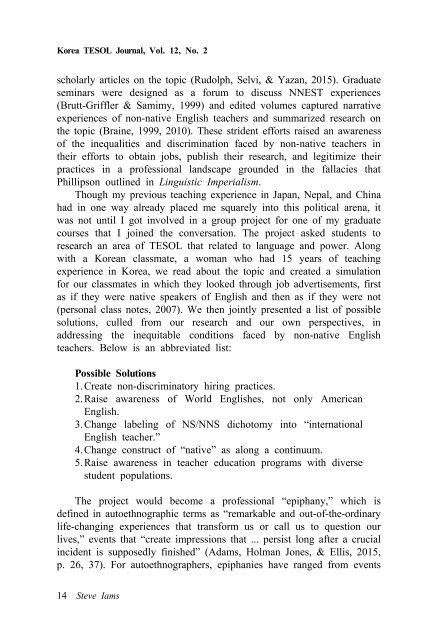- Page 2 and 3: Korea TESOL Journal Volume 12, Numb
- Page 4 and 5: Korea TESOL Journal, Vol. 12, No. 2
- Page 6 and 7: Korea TESOL Journal, Vol. 12, No. 2
- Page 8 and 9: Korea TESOL Journal, Vol. 12, No. 2
- Page 10 and 11: Korea TESOL Journal, Vol. 12, No. 2
- Page 12 and 13: Korea TESOL Journal, Vol. 12, No. 2
- Page 14 and 15: Korea TESOL Journal, Vol. 12, No. 2
- Page 16 and 17: Korea TESOL Journal, Vol. 12, No. 2
- Page 18 and 19: Korea TESOL Journal, Vol. 12, No. 2
- Page 20 and 21: Korea TESOL Journal, Vol. 12, No. 2
- Page 24 and 25: Korea TESOL Journal, Vol. 12, No. 2
- Page 26 and 27: Korea TESOL Journal, Vol. 12, No. 2
- Page 28 and 29: Korea TESOL Journal, Vol. 12, No. 2
- Page 30 and 31: Korea TESOL Journal, Vol. 12, No. 2
- Page 32 and 33: Korea TESOL Journal, Vol. 12, No. 2
- Page 34 and 35: Korea TESOL Journal, Vol. 12, No. 2
- Page 36 and 37: Korea TESOL Journal, Vol. 12, No. 2
- Page 38 and 39: Korea TESOL Journal, Vol. 12, No. 2
- Page 40 and 41: Korea TESOL Journal, Vol. 12, No. 2
- Page 42 and 43: Korea TESOL Journal, Vol. 12, No. 2
- Page 44 and 45: Korea TESOL Journal, Vol. 12, No. 2
- Page 46 and 47: Korea TESOL Journal, Vol. 12, No. 2
- Page 48 and 49: Korea TESOL Journal, Vol. 12, No. 2
- Page 50 and 51: Korea TESOL Journal, Vol. 12, No. 2
- Page 52 and 53: Korea TESOL Journal, Vol. 12, No. 2
- Page 54 and 55: Korea TESOL Journal, Vol. 12, No. 2
- Page 56 and 57: Korea TESOL Journal, Vol. 12, No. 2
- Page 58 and 59: Korea TESOL Journal, Vol. 12, No. 2
- Page 60 and 61: Korea TESOL Journal, Vol. 12, No. 2
- Page 62 and 63: Korea TESOL Journal, Vol. 12, No. 2
- Page 64 and 65: Korea TESOL Journal, Vol. 12, No. 2
- Page 66 and 67: Korea TESOL Journal, Vol. 12, No. 2
- Page 68 and 69: Korea TESOL Journal, Vol. 12, No. 2
- Page 70 and 71: Korea TESOL Journal, Vol. 12, No. 2
- Page 72 and 73:
Korea TESOL Journal, Vol. 12, No. 2
- Page 74 and 75:
Korea TESOL Journal, Vol. 12, No. 2
- Page 76 and 77:
Korea TESOL Journal, Vol. 12, No. 2
- Page 78 and 79:
Korea TESOL Journal, Vol. 12, No. 2
- Page 80 and 81:
Korea TESOL Journal, Vol. 12, No. 2
- Page 82 and 83:
Korea TESOL Journal, Vol. 12, No. 2
- Page 84 and 85:
Korea TESOL Journal, Vol. 12, No. 2
- Page 86 and 87:
Korea TESOL Journal, Vol. 12, No. 2
- Page 88 and 89:
Korea TESOL Journal, Vol. 12, No. 2
- Page 90 and 91:
Korea TESOL Journal, Vol. 12, No. 2
- Page 92 and 93:
Korea TESOL Journal, Vol. 12, No. 2
- Page 94 and 95:
Korea TESOL Journal, Vol. 12, No. 2
- Page 96 and 97:
Korea TESOL Journal, Vol. 12, No. 2
- Page 98 and 99:
Korea TESOL Journal, Vol. 12, No. 2
- Page 100 and 101:
Korea TESOL Journal, Vol. 12, No. 2
- Page 102 and 103:
Korea TESOL Journal, Vol. 12, No. 2
- Page 104 and 105:
Korea TESOL Journal, Vol. 12, No. 2
- Page 106 and 107:
Korea TESOL Journal, Vol. 12, No. 2
- Page 108 and 109:
Korea TESOL Journal, Vol. 12, No. 2
- Page 110 and 111:
Korea TESOL Journal, Vol. 12, No. 2
- Page 112 and 113:
Korea TESOL Journal, Vol. 12, No. 2
- Page 114 and 115:
Korea TESOL Journal, Vol. 12, No. 2
- Page 116 and 117:
Korea TESOL Journal, Vol. 12, No. 2
- Page 118 and 119:
Korea TESOL Journal, Vol. 12, No. 2
- Page 120 and 121:
Korea TESOL Journal, Vol. 12, No. 2
- Page 122 and 123:
Korea TESOL Journal, Vol. 12, No. 2
- Page 124 and 125:
Korea TESOL Journal, Vol. 12, No. 2
- Page 126 and 127:
Korea TESOL Journal, Vol. 12, No. 2
- Page 128 and 129:
Korea TESOL Journal, Vol. 12, No. 2
- Page 130 and 131:
Korea TESOL Journal, Vol. 12, No. 2
- Page 132 and 133:
Korea TESOL Journal, Vol. 12, No. 2
- Page 134 and 135:
Korea TESOL Journal, Vol. 12, No. 2
- Page 136 and 137:
Korea TESOL Journal, Vol. 12, No. 2
- Page 138 and 139:
Korea TESOL Journal, Vol. 12, No. 2
- Page 140 and 141:
Korea TESOL Journal, Vol. 12, No. 2
- Page 142 and 143:
Korea TESOL Journal, Vol. 12, No. 2
- Page 144 and 145:
Korea TESOL Journal, Vol. 12, No. 2
- Page 146 and 147:
Korea TESOL Journal, Vol. 12, No. 2
- Page 148 and 149:
Korea TESOL Journal, Vol. 12, No. 2
- Page 150 and 151:
Korea TESOL Journal, Vol. 12, No. 2
- Page 152 and 153:
Korea TESOL Journal, Vol. 12, No. 2
- Page 154 and 155:
Korea TESOL Journal, Vol. 12, No. 2
- Page 156 and 157:
Korea TESOL Journal, Vol. 12, No. 2
- Page 158 and 159:
Korea TESOL Journal, Vol. 12, No. 2
- Page 160 and 161:
Korea TESOL Journal, Vol. 12, No. 2
- Page 162 and 163:
Korea TESOL Journal, Vol. 12, No. 2
- Page 164 and 165:
Korea TESOL Journal, Vol. 12, No. 2
- Page 166 and 167:
Korea TESOL Journal, Vol. 12, No. 2
- Page 168 and 169:
Korea TESOL Journal, Vol. 12, No. 2
- Page 170 and 171:
Korea TESOL Journal, Vol. 12, No. 2
- Page 172 and 173:
Korea TESOL Journal, Vol. 12, No. 2
- Page 174 and 175:
Korea TESOL Journal, Vol. 12, No. 2
- Page 176 and 177:
Korea TESOL Journal, Vol. 12, No. 2
- Page 178 and 179:
Korea TESOL Journal, Vol. 12, No. 2
- Page 180 and 181:
Korea TESOL Journal, Vol. 12, No. 2
- Page 182 and 183:
Korea TESOL Journal, Vol. 12, No. 2
- Page 184 and 185:
Korea TESOL Journal, Vol. 12, No. 2
- Page 186 and 187:
Korea TESOL Journal, Vol. 12, No. 2
- Page 188 and 189:
Korea TESOL Journal, Vol. 12, No. 2
- Page 190 and 191:
Korea TESOL Journal, Vol. 12, No. 2
- Page 192 and 193:
Korea TESOL Journal, Vol. 12, No. 2
- Page 194 and 195:
Korea TESOL Journal, Vol. 12, No. 2
- Page 196 and 197:
Korea TESOL Journal, Vol. 12, No. 2
- Page 198 and 199:
Korea TESOL Journal, Vol. 12, No. 2
- Page 200 and 201:
Korea TESOL Journal, Vol. 12, No. 2
- Page 202 and 203:
Korea TESOL Journal, Vol. 12, No. 2
- Page 204 and 205:
Korea TESOL Journal, Vol. 12, No. 2
- Page 206 and 207:
Korea TESOL Journal, Vol. 12, No. 2
- Page 208 and 209:
Korea TESOL Journal, Vol. 12, No. 2
- Page 210 and 211:
Korea TESOL Journal, Vol. 12, No. 2
- Page 212 and 213:
Korea TESOL Journal, Vol. 12, No. 2
- Page 214 and 215:
Korea TESOL Journal, Vol. 12, No. 2
- Page 216 and 217:
Korea TESOL Journal, Vol. 12, No. 2
- Page 218 and 219:
Korea TESOL Journal, Vol. 12, No. 2
- Page 220 and 221:
Korea TESOL Journal, Vol. 12, No. 2
- Page 222 and 223:
Korea TESOL Journal, Vol. 12, No. 2
- Page 224 and 225:
Korea TESOL Journal, Vol. 12, No. 2
- Page 226 and 227:
Korea TESOL Journal, Vol. 12, No. 2
- Page 228 and 229:
Korea TESOL Journal, Vol. 12, No. 2
- Page 230 and 231:
Korea TESOL Journal, Vol. 12, No. 2
- Page 232 and 233:
Korea TESOL Journal, Vol. 12, No. 2
- Page 234 and 235:
Korea TESOL Journal, Vol. 12, No. 2
- Page 236 and 237:
Korea TESOL Journal, Vol. 12, No. 2
- Page 238 and 239:
Korea TESOL Journal, Vol. 12, No. 2
- Page 240 and 241:
Korea TESOL Journal, Vol. 12, No. 2
- Page 242 and 243:
Korea TESOL Journal, Vol. 12, No. 2



